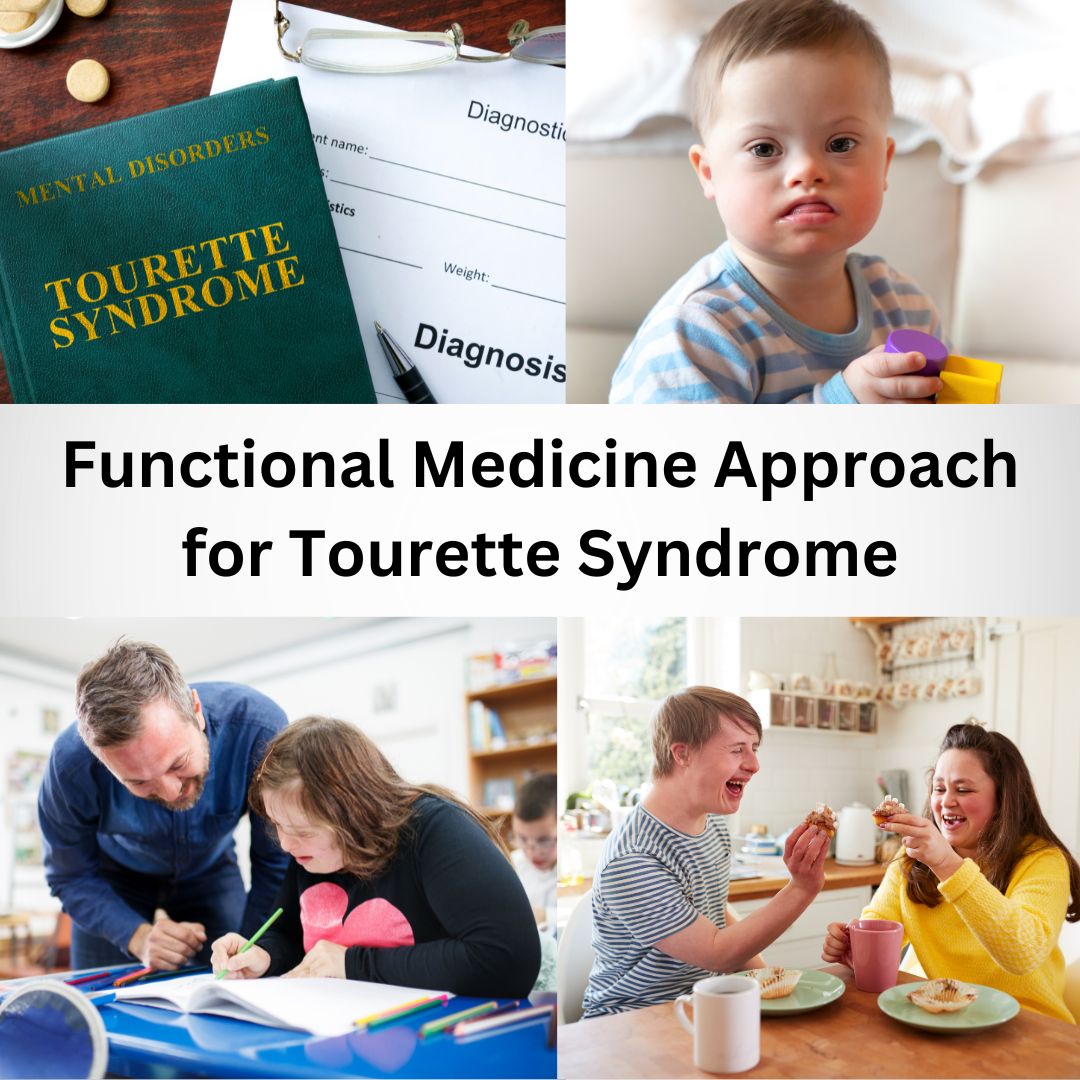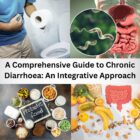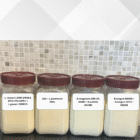Functional Medicine Approach for Tourette Syndrome
Tourette Syndrome (TS) is a neuropsychiatric disorder characterised by involuntary motor and vocal tics, affecting many children’s worldwide. While symptoms often improve with age, many individuals also contend with other overlapping conditions like ADHD and OCD. A functional medicine approach focuses on uncovering the underlying causes of TS, emphasising a holistic perspective that prioritises overall health and well-being. By addressing factors such as nutritional deficiencies, stress responses, and immune regulation, GUT brain axis with specific microbiome strains approach offers a comprehensive pathway for managing TS without relying on traditional pharmaceuticals, ultimately aiming to enhance the quality of life for affected individuals and many cases reversal.
Understanding the Pathophysiology of Tourette Syndrome
1. Brain Connectivity
Tourette Syndrome (TS) is associated with changes in key brain regions, particularly the basal ganglia, frontal gyrus, and cerebellum. These areas are crucial for movement control and impulse regulation, and alterations in their connectivity lead to the development of tics.
2. Neurotransmitter Imbalance
A significant factor in TS is the dysregulation of dopamine activity, particularly involving D1 and D2 receptors. Additionally, imbalances in glutamate and GABA—two vital neurotransmitters—exacerbate symptoms, highlighting the importance of neurotransmitter equilibrium in managing TS.
3. Immune Response
The immune system plays a pivotal role in TS, with elevated cytokine levels linked to neuroinflammation. This inflammation disrupts neural pathways and is thought to contribute to the onset and persistence of tics.
4. Nutritional Deficiencies
Nutritional status is critical in TS, as deficiencies in iron and vitamin D have been correlated with increased tic severity. Ensuring adequate levels of these nutrients helps mitigate symptoms and improve overall brain health.

Identifying Risk Factors
1. Nutritional Status
A thorough evaluation of dietary intake is essential for identifying nutritional deficiencies that contribute to the severity of Tourette Syndrome (TS). Key nutrients, such as iron and vitamin D, play significant roles in neurological health, and their inadequacy often exacerbates tic symptoms.
2. Sleep Quality
Sleep disturbances are prevalent among individuals with TS and significantly impact symptom severity. Assessing sleep hygiene—practices that promote restful sleep—is crucial for managing tics, as poor sleep leads to increased irritability and stress, further worsening symptoms.
3. Stress and Trauma
Both acute and chronic stressors influence the frequency and intensity of tics. Understanding a patient’s stress levels and history of trauma is vital for developing effective management strategies, as reducing stress leads to improvements in tic control and overall well-being.
Key Drivers of Tourette Syndrome
Tourette Syndrome (TS) is a complex neurodevelopmental disorder characterized by motor and vocal tics. Understanding its key drivers provide insights into management and treatment strategies. Here’s a breakdown of the factors you’ve outlined:
1. Stress Response
- Impact of High Cortisol Levels on Tic Severity: Stress is known to exacerbate tic disorders. Elevated cortisol levels, a marker of stress, lead to increased tic frequency and severity. Managing stress through therapy, relaxation techniques, and lifestyle changes helps mitigate symptoms.
2. Autoimmune Activity
- Connection Between Autoimmune Disorders and Tic Severity: There is growing evidence suggesting a link between autoimmune conditions and tic disorders. Certain autoimmune responses influence the nervous system, potentially worsening tic expression. Addressing underlying autoimmune issues could be beneficial for individuals with TS.
3. Dietary Influences
- Benefits of a Gluten-Free Diet for Sensitive Individuals: Some individuals with TS report improvements in tic severity on a gluten-free diet. While the evidence is still emerging, dietary modifications help reduce inflammation or sensitivity in certain cases, offering a complementary approach to managing symptoms.
4. Traumatic Brain Injury (TBI)
- Increased Risk of Neuropsychiatric Conditions Following TBI: Individuals who have experienced a TBI have a heightened risk of developing tic disorders or exacerbating existing tics. The injury disrupts neurological pathways, leading to increased neuropsychiatric symptoms. Monitoring and supportive care following a TBI is essential for those with a predisposition to TS.

Treatment Priorities in Functional Medicine for Tourette Syndrome
- Nutritional Support
Correcting deficiencies, particularly in iron and vitamin D, is crucial as these nutrients have been linked to tic severity, promoting better neurological function and overall health. - Stress Management
Implementing techniques like mindfulness and relaxation helps regulate the HPA axis, reducing stress-induced exacerbation of tics and fostering emotional resilience. - Dietary Modifications
Assessing gluten sensitivity and promoting a balanced diet significantly impact symptom severity, enhancing overall well-being through improved nutrition. - Immune Regulation
Strategies aimed at reducing inflammation and supporting immune health are essential for managing Tourette Syndrome, as dysregulated immune responses exacerbate symptoms.
Natural Support Strategies
A functional medicine approach to Tourette Syndrome emphasizes natural support strategies that help manage symptoms and improve overall well-being. By focusing on herbal remedies and nutritional supplements, individuals potentially reduce tic severity and enhance neurological health.
Herbal Support for Stress:
- Passionflower: Known for its calming properties, passionflower helps reduce anxiety and promotes relaxation, which alleviates tic exacerbation.
- Zizyphus: This herb supports GABA receptor activity, helping to counteract excitability in the brain and providing a calming effect.
- Magnolia: With its muscle-relaxing and neuroprotective properties, magnolia helps manage stress and promotes a sense of calm, further supporting tic management.
Nutritional Supplements for Tourette Syndrome
Incorporating specific nutritional supplements plays a crucial role in managing Tourette Syndrome symptoms by supporting neurotransmitter balance and overall brain health.
- Magnesium: This essential mineral helps regulate neurotransmitter activity, supports relaxation, and reduces stress, which is beneficial in managing tics.
- Vitamin B6: Vital for the synthesis of neurotransmitters like GABA and dopamine, adequate B6 levels help stabilize mood and improve neurological function.
- Taurine: An amino acid that supports inhibitory neurotransmitter activity, taurine helps reduce neuronal excitability and promotes a calming effect on the nervous system.
- Zinc: Known for its role in cognitive function and immune health, zinc helps modulate neurotransmitter activity and reduces the severity of tics.
GABA Supplementation
GABA (Gamma-Aminobutyric Acid) is a key inhibitory neurotransmitter that helps regulate neuronal excitability and promote relaxation. Supplementing with GABA offer several benefits for managing Tourette Syndrome.
- Dosage: Typical dosages range from 250 to 500 mg taken before bedtime. This timing enhances its calming effects during sleep, potentially improving overall symptom management.
- Benefits: GABA supplementation helps reduce tic severity by lowering neuronal hyperactivity, thereby promoting a sense of calm and improving mood. This is especially beneficial in mitigating the anxiety and stress that often exacerbate tics. Additionally, better sleep quality from GABA’s calming effects further supports overall neurological health.
Omega-3 Fatty Acids
Omega-3 fatty acids, particularly eicosapentaenoic acid (EPA) and docosahexaenoic acid (DHA), play a crucial role in brain health and overall well-being.
- Role in Inflammation: EPA and DHA have potent anti-inflammatory properties, which help reduce neuroinflammation linked to Tourette Syndrome. Lower inflammation levels alleviate symptoms and improve neurological function.
- Support for Brain Health: DHA is a major structural component of the brain, essential for maintaining neuronal health and supporting cognitive functions. Adequate levels of omega-3s enhance neurotransmitter activity and promote better mood regulation, which is vital for managing tic disorders.
- Dosage Recommendations: Regular supplementation with omega-3s, ideally ranging from 1,000 to 3,000 mg of combined EPA and DHA per day, contributes to significant improvements in tic severity and overall mental health.
Probiotic and Prebiotic Support
Probiotics play an essential role in maintaining gut health, which significantly impact neurological function and overall well-being.
- Lactobacillus paracasei: This probiotic strain has been shown to support immune system balance and reduce inflammation. It mitigates overactive immune responses that exacerbate symptoms of Tourette Syndrome, promoting a more stable neurological environment.
- Lactobacillus rhamnosus: Known for its ability to enhance gut microbiota diversity, this strain supports digestive health and positively influence mood and behavior. It has been associated with reduced anxiety and stress levels, which further help in managing tics and improving quality of life.
- L. Plantarum PS128: has been found to increase levels of dopamine and serotonin in the brain, it reduces 2,5-Dimethoxy-4-iodoamphetamine-induced tic-like behaviors via its influences on the microbiota–gut-brain-axis. PS128 helps alleviate neurological symptoms associated with Tourette syndrome, promoting overall cognitive and emotional well-being.
- L. reuteri ( ATCC PTA 6475, DSM 17938 ): Known for its ability to modulate stress responses, L. reuteri potentially reduces the frequency and severity of tics in individuals with Tourette syndrome, fostering a calmer nervous system and improving behavioral outcomes
- Bifidobacterium longum 1714: This probiotic strain is known for its ability to modulate stress responses and enhance cognitive function. By supporting mental resilience and reducing anxiety, it may help alleviate the severity of tics in individuals with Tourette syndrome.
- Bifidobacterium longum 35624: Renowned for its role in promoting gut-brain communication, this strain can improve overall gut health and reduce inflammation. Its calming effects on the nervous system contribute to fewer tics and better emotional regulation in those with Tourette syndrome.
- Furthermore, prebiotics like inulin, fructooligosaccharides (FOS), and galactooligosaccharides (GOS) support the growth of beneficial gut bacteria, promoting a healthy microbiome. This enhanced gut health helps reduce inflammation and improve mood regulation, potentially alleviating symptoms of Tourette syndrome.
Overall Benefits: Regular supplementation with these probiotics and prebiotics enhances gut-brain communication, potentially leading to reduced tic severity and improved emotional well-being.
The Impact of Heavy Metals on Tourette Syndrome
Heavy metals, such as lead, mercury, and cadmium accumulate in the body and disrupt normal neurological function. These toxic substances interfere with neurotransmitter systems and contribute to inflammatory processes, potentially exacerbating tic disorders. For individuals with Tourette syndrome, reducing heavy metal exposure is a critical component of a holistic treatment strategy.
In functional medicine, the goal is to identify and address the root causes of symptoms rather than merely alleviating them. This approach often includes testing for heavy metals and implementing detoxification strategies to mitigate their effects on the body.
The Role of Probiotics in Heavy Metal Management
Emerging research highlights the potential of probiotics in supporting the body’s natural detoxification processes. Strains like Lactobacillus plantarum 299v and Lactobacillus plantarum DSM 33464 have shown promise in helping manage heavy metals in the gut.
- Lactobacillus plantarum 299v: This specific strain of probiotic has been studied for its ability to enhance gut health and potentially reduce inflammation. By improving gut barrier function, 299v helps prevent the absorption of harmful substances, including heavy metals, thereby promoting overall neurological health.
- Lactobacillus plantarum DSM 33464: Known for its ability to bind toxins and heavy metals in the gastrointestinal tract, this probiotic facilitates their excretion from the body. This binding action not only aids in detoxification but also supports the overall balance of gut microbiota, which is crucial for mental and physical health.
Diet and Lifestyle Recommendations
A well-rounded diet and healthy lifestyle choices play a crucial role in managing Tourette Syndrome symptoms.
Dietary Approaches
Emphasizing the Mediterranean Diet: Rich in fruits, vegetables, whole grains, lean proteins, and healthy fats, the Mediterranean diet is known as one of the best anti-inflammatory diets. This diet supports brain health, reduces psychological stress, and helps in stabilizing mood, all of which positively influence tic severity.
Potential Benefits of a Gluten-Free Diet: Some individuals with Tourette Syndrome experience improvement in symptoms when following a gluten-free diet. This approach helps reduce inflammation and gut sensitivity, particularly in those with non-celiac gluten sensitivity, leading to a potential decrease in tic frequency and severity.
By adopting these dietary strategies, individuals promote overall health while addressing specific symptoms of Tourette Syndrome.
Lifestyle Modifications for Tourette Syndrome
Implementing effective lifestyle changes can significantly enhance the management of Tourette Syndrome and improve overall well-being.
- Education and Awareness for Families and Educators: Increasing understanding of Tourette Syndrome among family members and educators fosters a supportive environment. Knowledge about the condition helps reduce stigma and promotes empathy, enabling better communication and accommodations.
- Cognitive Behavioral Therapy (CBT) Techniques: CBT is beneficial for managing tics and associated behavioral challenges. Techniques such as habit reversal training help individuals recognize and modify tic-related behaviors, promoting greater self-control and confidence.
- Stress Reduction Activities: Practices like yoga and meditation effectively lower stress levels, which exacerbate tic symptoms. These activities promote relaxation, enhance emotional regulation, and improve mental clarity, creating a more balanced state of mind.
- Importance of Regular Exercise: Engaging in regular physical activity, ideally 2.5 to 5 hours of moderate-intensity exercise per week, helps reduce stress and anxiety. Exercise releases endorphins improves mood, and enhances overall physical health, contributing to better management of Tourette Syndrome symptoms.
By incorporating these lifestyle modifications, individuals with Tourette Syndrome create a more supportive environment for themselves, fostering resilience and improving their quality of life.
Clinical Assessment and Monitoring
Effective management of Tourette Syndrome (TS) requires ongoing clinical assessment and monitoring to tailor interventions and track progress.
- Tools for Evaluating Tic Severity (YGTSS): The Yale Global Tic Severity Scale (YGTSS) is a standardized tool that helps clinicians quantify tic severity and frequency, enabling informed treatment decisions. Regular assessments using the YGTSS provide insight into the effectiveness of interventions.
- Importance of Regular Nutritional Screenings: Nutritional deficiencies exacerbate TS symptoms. Regular screenings for essential nutrients, such as iron and vitamin D, help identify deficiencies that need to be addressed to improve overall health and tic management.
- Adjustments to Management Plans Based on Assessments: Continuous monitoring allows for timely adjustments to treatment strategies. Based on the results from tools like the YGTSS and nutritional screenings, healthcare providers refine dietary recommendations, supplement regimens, and stress management techniques, ensuring a holistic approach to TS care.
Conclusion
A functional medicine approach to Tourette Syndrome emphasizes understanding and addressing the underlying factors contributing to tic severity. By focusing on nutritional support, stress management, dietary modifications, and immune regulation, individuals experience meaningful improvements in their symptoms. Integrating natural support strategies, lifestyle modifications, and regular clinical assessments further enhances this holistic framework.
References
- https://www.ncbi.nlm.nih.gov/books/NBK499958/
- https://www.tandfonline.com/doi/abs/10.1300/J381v09n01_05
- https://www.sciencedirect.com/topics/neuroscience/tourette-syndrome
- https://pubmed.ncbi.nlm.nih.gov/34835954/
- https://pubmed.ncbi.nlm.nih.gov/20337969/
- https://www.ncbi.nlm.nih.gov/pmc/articles/PMC8619307/









